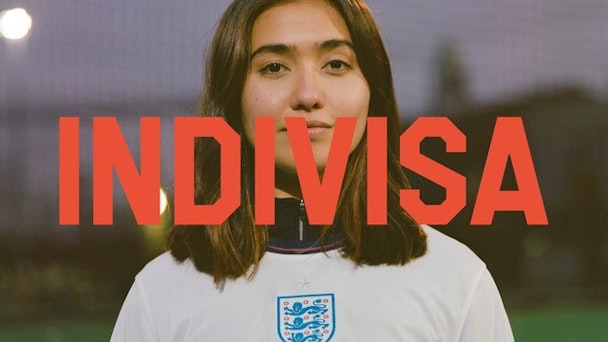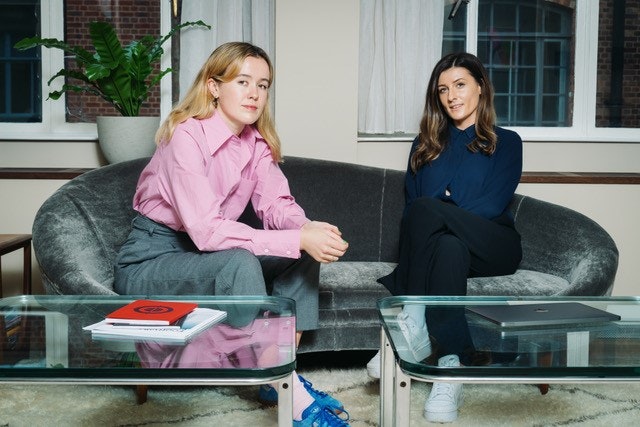Goal.com publisher debuts female football fan platform to counter social media 'toxicity'
Footballco, the publisher behind the behemoth soccer site Goal.com, is launching a sister brand for female football fans. Its founders tell Ian Burrell why a safe platform for women who love the game is needed to counter the 'toxic' trolling and abuse culture that all too often abounds on social media.

Lili Shi of Victoria Park Vixens
The advances made by women in football media over recent seasons have come at a heavy price. Amazon Prime pundit and former England star Karen Carney faced a pile-on of sexist abuse after being mocked by Leeds United’s Twitter account. The BBC’s Alex Scott underwent therapy to cope with online trolls. Her colleague Kelly Somers was told to “get off Final Score and stick to women’s football”.
When a female perspective of the game is given, too many male fans dive in studs up to play the woman and not the ball. Or else they dismiss mainstream coverage of women’s football results with the ubiquitous social media response: “Who cares?”
But now there is an alternative, with women being offered their own football media platform, where female fans and players of all levels can come together to share their love of the game without being accused of “fancying” the players or being patronized on the offside rule.
Indivisa, which has launched today on International Women’s Day, is a sister brand to the giant Goal network, the biggest digital football platform in the world. Crucially, the project has been conceived by women at Goal's London-based publisher Footballco, who argued that the time has come for a media channel that covers the game from a female point of view.
“We wanted to create a channel that is through a female lens for all the different types of female fans,” says Morgan Brennan, who pulled together the blueprint for the idea. Indivisa will cover “all aspects of the game from pro to grassroots to amateur to officials…,” she says. “We saw a massive gap and huge opportunity to create a dedicated space to cover all of those."
Indivisa will speak to “all types” of (female) fans, from “someone who has watched matches with their dad but doesn’t play themselves, to someone who wants to be a professional female footballer”.
Brennan, who works as a creative at Footballco, has been playing the game since she was five years old in Sydney. After moving to the UK she founded Victoria Park Vixens, an east London women’s club with four teams. That role brings frequent reminders that inequalities in the game still exist. “As a women’s team we need access to a pitch that is lit in the evenings and is safe…[but] men’s clubs that have been around a lot longer have money in the kitty and do bulk booking so there are no pitches left for us.”
Her Footballco colleague Cathy Bettinson, an account director and an Arsenal fan (of both the men’s and women’s teams), was another member of the Indivisa working group. Time and again she has faced questioning from male fans on her football credentials. “It has been really difficult in the past for women to feel accepted within football culture,” she says. “If you are a male you are automatically part of football fan culture – women have to work a lot harder.”

Women’s football has never had a higher profile. In the UK that is largely thanks to a three-year broadcast rights deal signed by the Football Association with the BBC and Sky Sports for coverage of the Barclays FA Women’s Super League. But the greater prominence of female teams and regular commentary from women on men’s games has triggered macho traditionalists who seem irked that pundits such as Chelsea coach Emma Hayes possess insights into the game beyond their comprehension.
Female fans deserve to be insulated from this backlash, says Bettinson. “Social media can be toxic and there will inevitably be trolls that are resistant to women’s football content,” she says. “That’s why we felt passionately that this needed to be a new space for female football fans where they could feel safe and contribute.”
Indivisa will initially focus on Instagram, where the bulk of the global female football community interacts. The intention is also to expand on TikTok, by showing football skills videos and UGC clips of amateur players, and on Twitter by offering live content linked to major fixtures and tournaments. The launch is timed to precede this summer’s Uefa Women’s Euros, hosted in England, and the 2023 FIFA World Cup taking place in Australia and New Zealand.
The Indivisa team is hoping to work with grassroots women’s media outlets such as the Instagram account On Paper, a digital archive of women’s football imagery curated by Harriet Duffy. They also admire Studs, an online site showcasing “the best of women’s football culture”. A collaborative approach with other content providers would reflect the findings of a recent report by the Space Between agency, which found that women’s sport fans had a great sense of community. “They are more likely to forge connections with other female fans, whereas male fans can be quite tribal,” says Bettinson.
Footballco will look to raise Indivisa's profile by exploiting Goal's global reach and resources. Goal has a dedicated women’s football correspondent, Ameé Ruszkai, and produces a podcast on US women’s football called All of Us, presented by goalkeeping legend Hope Solo.
Indivisa is Latin for “undivided”. Footballco content director Mark Patterson says that, rather than launch a “Goal Women” product with similarities to existing football media, it was important to “start again” and allow female fans to create something new. “There is a tendency within the industry, because it is very male-skewed, to do something quite samey. It was important to take a step back from that and let somebody else’s vision of football take effect.”
Using the slogan “Indivisa - Your Women’s Football Community”, designer Lily Scowen has produced a purple and pink brand identity that is more lifestyle than football. That was very deliberate. “I think football is quickly becoming a key part of female culture for a lot of women,” says Bettinson. “That’s something we see Indivisa existing for."
